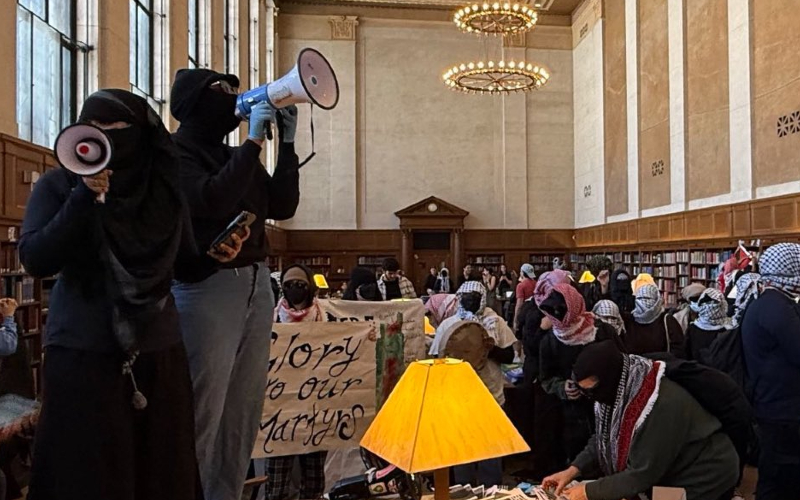Many in Israel welcomed Donald Trump's re-election in November as the beginning of a stronger relationship with the United States, one that had become strained under former President Joe Biden's leadership.
Trump's record on Israel during his first term as president supported that theory, and so did his 2024 campaign promises, such as advancing the Abraham Accords of his first term, executing the war against Hamas, his Iran strategy, and holding U.S. college campuses accountable for allowing and promoting antisemitic propaganda.
Now, however, there are signs that many interpret as cracks in the armor.

"There are a number of things that have happened recently that many people here in Israel are concerned that there's a growing daylight between the Trump administration and the government here in Israel," Chris Mitchell, Middle East Bureau chief for CBN News, said on Washington Watch Monday.
For example, the Trump administration earlier this month announced an agreement for the Iran-backed and Yemen-based Houthis to end their long-running attacks on U.S. shipping in the Red Sea. In return, the U.S. will stop its bombing campaign against the Houthis that had intensified in air raids over Yemen.
The Houthis began attacking Israel and the U.S. after Hamas killed more than 1,200 Israelis and kidnapped many others on Oct. 7, 2023, setting off its war with Israel.
Under this agreement, the Houthis have agreed to stop attacks against the U.S., but not Israel.
Tension between Netanyahu and Trump
Israeli Prime Minister Benjamin Netanyahu has privately expressed his growing frustration with Trump's negotiations with Iran.
Where Netanyahu sees an opportunity to finally take out Iran's nuclear facilities, Trump sees an opportunity to remove the threat of Iran acquiring a nuclear weapon by making a deal. As Israel hits Gaza with a new military offensive, Trump is pushing for a ceasefire and looking to implement his postwar plan for rebuilding the area into a "Riviera of the Middle East."
And after Trump halted the U.S. military campaign against the Iranian-backed Houthi militant group, a shocked Netanyahu said Israel would then defend itself.
Additionally, NBC News reported Netanyahu was upset last week when Trump publicly stated that he had yet to decide whether Iran would be allowed to enrich uranium under the deal his administration is negotiating.
Meanwhile, Trump has been frustrated by Netanyahu's decision to begin a new military offensive in Gaza, which Trump sees as a contradiction to his plans to rebuild the area.
There are concerns in Israel that continuing negotiations between the U.S. and Iran are just allowing Iran to "run out the clock" and finish the job of building nuclear weapons.
"The Iranians are masters at prolonging the talks while they continue to enrich uranium to near-military grade and continue their nuclear program," Mitchell told show host Tony Perkins. "That's exactly the concern that many people have here in Israel."
From Israel's perspective, there is no need to discuss Iran's ability to enrich uranium "if you want to dismantle and destroy Iran's nuclear infrastructure," which has been Netanyahu's single goal for any talks with Iran.
Further complicating the U.S.-Israel relationship is Trump's ongoing consideration of accepting a $400 million luxury jet as a gift from Qatar, which has a documented history of support for Hamas.
Qatar positioned itself as a lead negotiator in the Israel-Hamas dispute and has transferred more than $1.8 billion to Hamas over the years with $30 million a month paid to Hamas over one stretch of time, according to a Qatari official interviewed by Der Spiegel in 2023.
In 2017, Saudi Arabia, the United Arab Emirates (UAE), Bahrain, and Egypt – the Gulf Cooperation Council – suspended Qatar over its ties to terrorism.
Qatar has also served as a strategic hub for U.S. military operations in the Persian Gulf.
The Foundation for Defense of Democracies, a Washington, D.C.-based nonprofit research institute focused on national security and foreign policy, says Qatar is trying to play both sides of the conflict.
Trump bypassing Israel on his current tour of the Middle East has also not gone unnoticed. He is in the neighborhood, but his scheduled stops include Saudi Arabia, UAE, and Qatar – not Israel.
The administration has defended the schedule, saying the trip is economic in nature and not focused primarily on security threats.
Will Trump talk Israel without Israel?
Mitchell is not so sure Trump's talks with Middle Eastern leaders will not include important Israel topics.
The Jerusalem Post has reported that a Trump meeting with Saudi Crown Prince Mohammed bin Salman will include Palestinian Authority Chairman Mahmoud Abbas, Lebanese President Joseph Aoun, and Syrian President Ahmed al-Sharaa.
According to The Jerusalem Post, the administration believes that if America recognizes a Palestinian state without Hamas, then more Middle Eastern countries will join the Abraham Accords, and the balance of power in the region will shift.
Israelis fear that a Palestinian state means giving up historic biblical land.
"That's dividing Israeli land right down the middle, if they gave the so-called West Bank – Judea and Samaria – to the Palestinian Authority," Mitchell explained. "I'm not saying they will say that. The White House actually denied they would do anything like that, but that's been a story."







